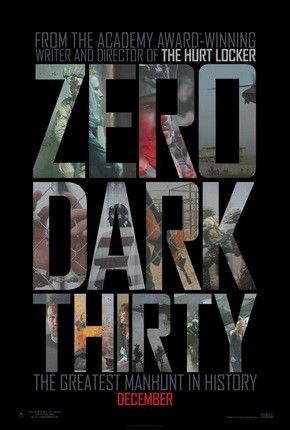Zero Dark Thirty and the CIA's Tortuous Hollywood Mission [BLOG]

Zero Dark Thirty - Kathryn Bigelow and Mark Boal's follow up to The Hurt Locker - tracks the hunt for and assassination of Osama bin Laden. It received rave reviews but, upon its US release, came under considerable fire from a series of politicians and commentators.
The problem this bipartisan group of critics have with the film is that it falsely portrays the key piece of information that led to bin Laden's death, the identity of his courier, being ascertained through torture. Fundamentally, it portrays "enhanced techniques" as an effective method of obtaining information, when CIA records have repeatedly stated otherwise.
Some would argue that manipulating your audience is a central pillar of filmmaking; hundreds of loosely historical films take considerable dramatic licence with their facts, but the difference here is that the film claims to tell the true story of one of the most politically-charged events of the decade.
The killing of bin Laden is a sacred moment in American political lore. It formed a centrepiece of Barrack Obama's re-election campaign, just as 9/11 and the continuation of the war on terror helped Bush to land his second term. The media's compliant and sympathetic portrayal of these events undeniably helps form public opinion of them.
The opening of the film boasts that it was "based on first-hand accounts of actual events" and even Bigelow herself has said that she was "working in that kind of journalistic space". In response to recent criticism, however, Boal remarked that "it's a movie, not a documentary." Boal and Bigelow are contradicting each other, and they simply can't have it both ways.
If content creators claim to provide a truthful or journalistic service, then they should expect be held to the same standards as journalists. If they want to make fiction, then they shouldn't deceitfully dress it up as a documentary.
Former Republican presidential candidate John McCain joined two Democrats in writing a public letter of complaint to Michael Lynton, the chairman of Sony Pictures, labelling the film "grossly inaccurate and misleading in its suggestion that torture resulted in information that led to the location of Osama bin Laden." Indeed even the perpetrators of said torture, the CIA, chastised the studio for what is at best reckless historical revisionism and at worst the glorification of torture. This came despite the CIA advising Sony Pictures as they produced the film, even being accused of providing them with improper access to non-public material.
It seems unlikely that the CIA were concerned that the film portrayed their use of torture in an overly positive light, but rather released the statement in order to protect themselves from the growing dispute surrounding the film and distance themselves from their dark past. The current CIA are undoubtedly trying to separate themselves from their Bush-era crimes but are still visibly unwilling to punish them, even going so far as to censor an ongoing court case surrounding the treatment of Guantanamo detainees. Evidently they don't have a problem with lying to the public, they have a problem with Sony Pictures telling the previous administration's lies and getting caught doing so.
While the ongoing debate surrounding the film's portrayal of torture is important and revealing, there is a broader and far more troubling debate that's not being had, surrounding the military's use of entertainment to raise public opinion and bolster recruitment.

Earlier this year the Department of Defense produced and released their first feature film, the critically panned Act of Valor. A glorified recruitment video, the film stars active duty Navy SEALs who were tasked with the dramatic recreation of five real-life military operations. These events were then loosely strung together by Kurt Johnstad, the screenwriter of the equally jingoistic 300.
Ultimately Act of Valor failed, both financially and in terms of public impact, because it was a heavy handed and poorly executed film. These risks explain why the Department of Defense has historically supported Hollywood productions rather than attempting their own. Indeed with the theatrical releases of Zero Dark Thirty and Act of Valor, this might seem a particularly eventful year for military filmmaking but the department has long relied on Hollywood to bolster recruitment and public image. They even have their own production office that, as far back as 1927, aided the Oscar-winning production of Wings.
Of course not every military film is supported by the production office; films like Apocalypse Now and Platoon went entirely unsupported, replacing heroism with harrowing brutality, questionable morality and psychological shock. The Department of Defense's habit of granting access, funding and even discounted military equipment to producers willing to tell their side of the story bears a worrying resemblance of their already troubling practice of selectively embedded-journalism.
Sceptics of the effectiveness of entertainment as a recruitment tool need look no further than the 500% recruitment boost of naval aviators following the release of Top Gun, another film the department helped to produce. Indeed the military was so ready to capitalise on the adrenaline high of Tony Scott's picture that they even erected recruitment stands right in the foyer of some theatres.
Everybody receives film differently and it would be both a mistake and an enormous discredit to the often patronised but evidently intelligent audience for these films to suggest they have brainwashing effect. It is unmistakable however that, through a sustained government-sponsored campaign of historical revisionism, public opinion can be altered and there is no better medium for these campaigns than Hollywood film. Zero Dark Thirty is a prime example of this practice: it's deceitful, degrading and we must expect more from our media.
Oliver Balaam writes for Concrete, the University of East Anglia's student newspaper, and you can follow him on Twitter @BalaamSafe.
© Copyright IBTimes 2025. All rights reserved.





















